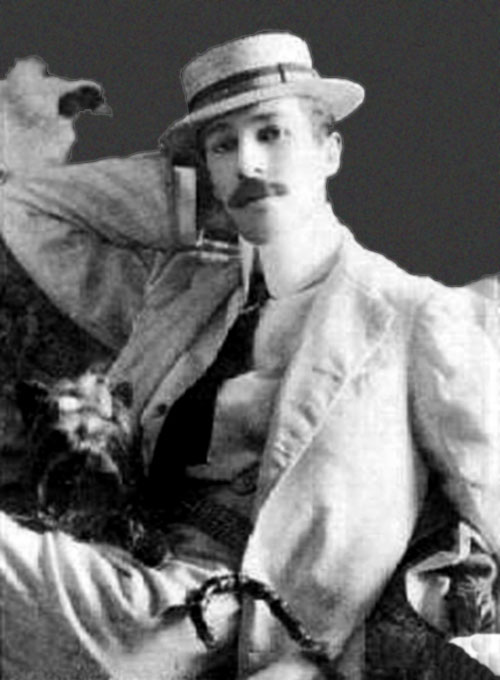Henry Cyril Paget – 5th Marquis of Anglesey
 (known until 1880 by the courtesy title of Lord Paget de Beaudesert and from 1880 until 1898 as Earl of Uxbridge)
(known until 1880 by the courtesy title of Lord Paget de Beaudesert and from 1880 until 1898 as Earl of Uxbridge)
(16 June 1875 – 14 March 1905) was a British Peer who was notable during his short life for squandering his inheritance on a lavish social life and accumulating massive debts. Regarded as the “black sheep” of the family, he was nicknamed “the dancing marquess” for his habit of performing “sinuous, sexy, snake-like dances”. He blew the equivalent of half-a-billion pounds on jewelled costumes and lavish lifestyle.
The Complete Peerage says that he “seems only to have existed for the purpose of giving a melancholy and unneeded illustration of the truth that a man with the finest prospects, may, by the wildest folly and extravagance, as Sir Thomas Browne says, ‘foully miscarry in the advantage of humanity, play away an uniterable life, and have lived in vain.'”
Paget was the eldest son of the 4th Marquess by his father’s second wife, Blanche Mary Boyd. Rumors persisted, however, that his biological father was the French actor Benoît-Constant Coquelin, a rumor that gained currency when, after the death of his mother in 1877, when he was two years old, Paget was raised by Coquelin’s sister in Paris until he was eight. His stepmother, from 1880, was an American, Mary Livingston King, the widow of the Hon Henry Wodehouse.
He attended Eton College, later receiving private tuition, and enlisted as a Lieutenant in the 2nd Volunteer Battalion of the Royal Welsh Fusiliers; on 20 January 1898 he married his cousin Lilian Florence Maud Chetwynd (1876—1962). Upon the death of his father on 13 October 1898, he inherited his title and the family estates with about 30,000 acres in Staffordshire, Dorset, Anglesey and Derbyshire, providing an annual income of £110,000.
Paget swiftly acquired a reputation for using his money to throw lavish parties and even more extravagant theatre performances. The most notable of these was a performance of Shakespeare’s Henry V, in which Paget himself played the title role. His wife disapproved of his lifestyle and obtained a decree nisi of divorce on 7 November 1900; it was later annulled due to nonconsummation, according to Lady Anglesey’s grandson by her second marriage, the historian Christopher Simon Sykes. The breakdown of his marriage effectively gave Paget more freedom to enjoy his self-indulgent lifestyle. By this stage he had already begun to mortgage his estates to raise money.
On 10 September 1901, Paget’s French valet Julian Gault took the opportunity of his employer’s absence at the theatre to steal jewellery to the value of £50,000. At the time, Paget was living in the Walsingham House Hotel in London. Gault, who was later arrested at Dover, testified in court that he had been instructed to steal the jewels by a French woman of his acquaintance called Mathilde (who had taken the jewels to France and was never found). Although Gault’s testimony was believed to be true, he pleaded guilty at the Old Bailey on 22 October and was sentenced to five years imprisonment.
By 1904, despite his inheritance and income, Paget had accumulated debts of £544,000 and on 11 June was declared bankrupt. His lavish wardrobe and jewels were sold to pay creditors, the jewels alone realising £80,000.
In 1905, Paget died in Monte Carlo following a long illness, with his ex-wife by his side, and his remains were returned to Llanedwen for burial. The Times reported that despite all that was known of him, he remained much liked by the people of Bangor who regretted to hear of his death. Lilian, Marchioness of Anglesey, married, in 1909, John Francis Grey Gilliat, a banker, by whom she had three children.
The title was passed down to his cousin Charles Henry Alexander Paget; subsequent holders of the title attempted to suppress the story of the “dancing marquess”.

